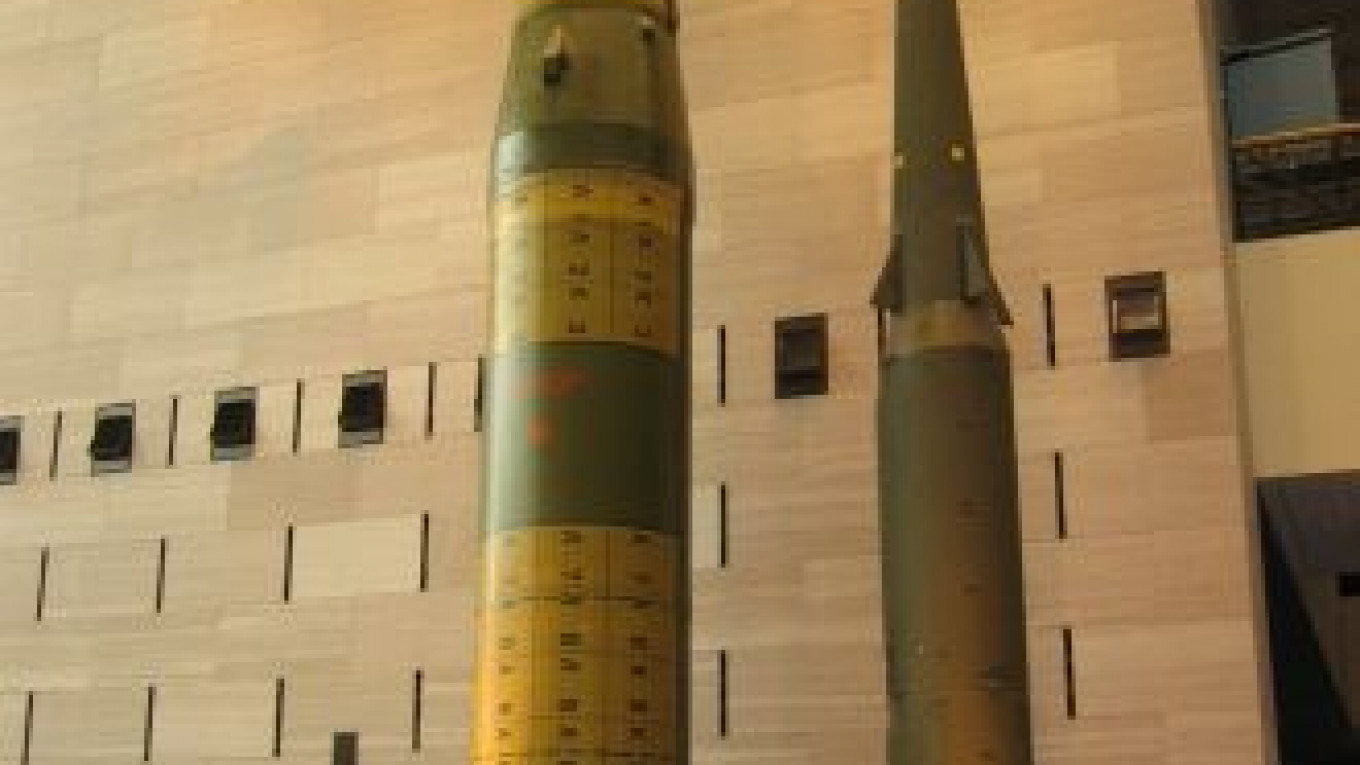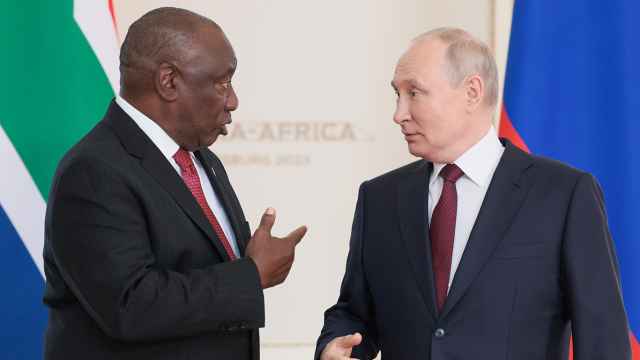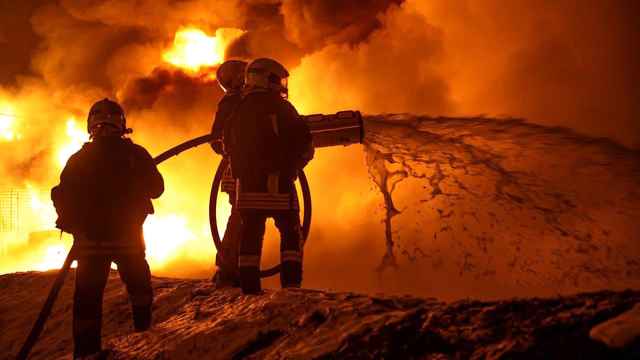Thirty Soviet inspectors moved to Utah in June 1988 to watch the gates of the Hercules plant, which manufactured Pershing II intermediate-range missiles.
The inspectors painstakingly inspected every exiting vehicle that was long enough to contain a banned missile.
The Americans selected the manufacturer of the Soviet SS-20 intermediate range missile, located near the Ural Mountains. The Votkinsk Machine Building Plant in Udmurtia, which at the time was closed to foreigners, became their target for continuous monitoring of treaty compliance.
The inspections, granted under the Intermediate-Range Nuclear Forces Treaty, marked the start of cooperation on nuclear arms control between the Cold War foes that has continued to this day, despite recent steps by Russia to curb the work.
"This growing trust has enabled the United States and Russia to work consistently through various international climates to secure and dismantle a vast array of WMDs, pooling our resources to make both nations safer, and indeed, to make the world safer," the U.S. Defense Threat Reduction Agency said in an e-mailed statement.
The INF Treaty, signed by Soviet leader Mikhail Gorbachev and U.S. President Ronald Reagan in 1987, called for the destruction of all nuclear missiles with a range of 500 to 5,500 kilometers. To this end, teams of inspectors deployed to Magna, Utah, and Votkinsk, the birthplace of composer Pyotr Tchaikovsky, whose father was a manger at the precursor to the modern weapons factory.
The 13-year mission of the Americans, which would later be extended due to START, a treaty on long-range missiles, was slightly more complicated than that of their Russian counterparts in Utah.
The Votkinsk plant, which had a long history of producing missiles, made not only the banned SS-20 but also the SS-25 Topol intercontinental ballistic missile. The Topol, the jewel in the crown of the Soviet strategic rocket forces, is similar to the SS-20 in that it travels on and is launched from the back of a truck. So U.S. inspectors had to be sure the Soviets weren't sneaking a banned SS-20 inside a slightly larger SS-25, whose production was not affected by the INF treaty.
Both sides had to create new government agencies to carry out the treaty work. The Nuclear Risk Reduction Center, headed by strategic rocket forces General Vladimir Medvedev under the Soviet Defense Ministry, was created to manage the inspection process at home and abroad. In the United States, Reagan signed an order creating the On-Site Inspection Agency to do the same.
The On-Site Inspection Agency hired contractors to supply and partially staff the treaty work.
Expanded Cooperation
The success of INF Treaty implementation and the burgeoning spirit of cooperation between the superpowers led to the 1992 Nunn-Lugar Act, which created a program known as Cooperative Threat Reduction. Its goal has been to secure and dismantle weapons of mass destruction and their infrastructure in the former Soviet Union.
In the 20 years the threat reduction program has functioned, billions of dollars have been spent by the United States on everything from destruction of chemical weapons to construction of security systems at nuclear facilities. The vast majority of spending and work has taken place in Russia, under the guidance of the U.S. Energy Department and the successor to the On-Site Inspection Agency, the Defense Threat Reduction Agency.
The work has been carried out by defense contractors Bechtel, Parsons, URS, Raytheon and others. They in turn have in many cases subcontracted key portions of work to Russian defense industry firms.
The cooperation between U.S. and Russian defense firms has been a key legacy of the original INF effort, as U.S. firms have implemented standard government contracting policies for their work in Russia.
"At first, Russian subcontractors are amazed at the number of forms we make them fill out, and they might not believe they have a chance of winning the business," said a senior U.S. executive with a defense contractor, who asked that his name not be published because he didn't have permission to speak to the media about defense matters. " But in the end, they like working with us because they eventually learn that they are getting a fair deal, even when we have them bid against each other."
The executive believes that the cooperation has broader ramifications.
"A whole generation of military officers and defense industry people on both sides have grown up together and learned to work together and understand each other while working toward a common goal," he said.
The interaction has created long-lasting friendships.
"I retain the greatest respect for the strategic rocket forces officers with whom I worked, especially the late General Medvedev, who was a true gentleman," said George Connell, a Marine colonel who was one of the first U.S. site commanders at Votkinsk. Connell eventually went on to serve as a vice president at Raytheon, where he oversaw the firm's Cooperative Threat Reduction work from 1990 to 2004.
Matrimony was another unexpected outcome of the INF treaty. In the rush to ramp up its ability to manage the incoming American inspectors, the Soviet Defense Ministry hired a batch of young female linguistic graduates to work at the portal monitoring facility, while the U.S. sent mostly male military and contractor inspectors. At least half a dozen marriages came out of relationships formed at the Votkinsk Portal Monitoring Facility. Some gave INF the nickname "International Nuptial Foundation."
Changing Winds
Despite the friendly atmosphere and positive reviews from both sides, Moscow has signaled that the times have charged and that the INF Treaty and the Cooperative Threat Reduction initiative are no longer needed.
"The need for cooperation is significantly less, and the economic situation in Russia has fundamentally changed," Deputy Defense Minister Anatoly Antonov said in response to e-mailed questions.
As early as February 2007, President Vladimir Putin said the INF Treaty no longer serves Russia's interests. General , said at the same time that Russia could pull out of INF due to NATO's plan for a missile shield in Europe.
Behind the scenes, discussions are ongoing about whether and how to continue the Cooperative Threat Reduction program, which is set to expire in June. Deputy Foreign Minister Sergei Ryabkov said in October that Moscow intends to end the 1992 agreement.
But U.S. President Barack Obama this week urged Russia to work with the United States to update the program.
"Russia has said that our current agreement hasn't kept pace with the changing relationship between our countries," Obama told anti-proliferation experts at the National War College in Washington. "Let's work with Russia as an equal partner. Let's continue the work that's so important to the security of both our countries. And I'm optimistic that we can."
Not everyone is so hopeful.
"I'm not very keen to express any optimism for future cooperative work because of the apparent mindset of the current Russian government," said Connell, the former U.S. defense contractor.
Deputy Prime Minister Dmitry Rogozin is equally skeptical about finding a compromise with the U.S. on a variety of defense issues, including U.S. plans to set up a missile defense shield in Europe.
"Concerning the missile defense system and how, as they assure us, it is not directed against Russia, we don't believe in words. Gorbachev believed, but we don't," Rogozin said at a security conference last month, Interfax reported.
"We need a written guarantee that the missile defense system being created in Europe is targeted against [only] short- and medium-range missiles," he said.
A Message from The Moscow Times:
Dear readers,
We are facing unprecedented challenges. Russia's Prosecutor General's Office has designated The Moscow Times as an "undesirable" organization, criminalizing our work and putting our staff at risk of prosecution. This follows our earlier unjust labeling as a "foreign agent."
These actions are direct attempts to silence independent journalism in Russia. The authorities claim our work "discredits the decisions of the Russian leadership." We see things differently: we strive to provide accurate, unbiased reporting on Russia.
We, the journalists of The Moscow Times, refuse to be silenced. But to continue our work, we need your help.
Your support, no matter how small, makes a world of difference. If you can, please support us monthly starting from just $2. It's quick to set up, and every contribution makes a significant impact.
By supporting The Moscow Times, you're defending open, independent journalism in the face of repression. Thank you for standing with us.
Remind me later.







